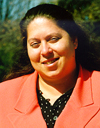Students learn as they serve community
It’s in the MUSC Strategic Plan.It was the focus of an October meeting of the 28 Healthy South Carolina Initiative project leaders. So expect service learning to eventually change the face of health care education here as it changes nationally.
Service learning shifts education out of the classroom and into the community. The project leaders are exploring ways to use their community-based programs as “classrooms” in which MUSC students can learn their profession as they serve.
 Dr.
Serena Seifer
Dr.
Serena Seifer
It’s a learn-to-serve and serve-to-learn concept that Serena Seifer, M.D., presented at the meeting, attended by government representatives, community partners, and faculty from the College of Charleston and Lander University. Later, a panel of community members, faculty and a student examined the concept with responses to Seifer’s presentation.
Seifer, executive director of Community-Campus Partnerships for Health, describes service learning as “a structured learning experience that combines community service with preparation and reflection. Students are not only expected to provide direct community service,” she said, “but also to learn about the context in which the service is provided, and to understand the connection between their service and their academic course work.”
Traditionally, clinical experiences focus on learning. And volunteerism is encouraged in programs like MUSC Gives Back where the emphasis is on service.
“Service learning combines the strengths of both,” says former associate provost for educational programs Jan Bellack, Ph.D., R.N. She, with Marilyn Laken, Ph.D., R.N., director of the Healthy South Carolina Initiative program, invited Seifer to address the group as part of their quarterly faculty development program.
The College of Dental Medicine’s new commitment to community outreach can be described by several curriculum changes that now provide community-based service learning experiences for all students, says the college’s community academic coordinator Sharon Crossley, RDH, MPH.
“In dental medicine, it’s important to involve other outreach components in dental education,” says the college’s associate dean for clinical affairs Charles Hook, DMD. “We need to sensitize the community to oral health issues and sensitize dental health providers to the needs of under served communities. It’s important that participants feel good about their experience.”
And those experiences can be overwhelming to inexperienced students, warns David Rivers, research associate with the Enterprise Community/MUSC Neighborhood Health Program. He says faculty need to guard against student burnout. He also says that a partnership involving the community as an active participant in creating or selecting service learning experiences is essential.
Rivers’ sentiments are echoed by the Trident Urban League’s Amy Bennington, Ida Taylor, director of the Gethsemane Community Center in the Enterprise Community and by medical student Shirley Woo, who shared her experiences in the Healthy South Carolina Initiatives project, “Health Effects of Rape Victimization.” They all emphasize the importance of involving the community in the earliest planning stages and warn that what may work in one project will not necessarily work in another.
Woo says that community service projects give the student a perspective that differs from traditional classroom and hospital experiences.
Providing a faculty perspective, MUSC director of the Sustainable Universities Initiative project, Michael Schmidt, Ph.D., says service learning experiences can change attitudes. He sees a need to help faculty, students, and administrators recognize and reward the good being done in community-based, service learning projects.
This process toward service learning began in the fall when Laken visited education dean Nancy Sorenson, Ph.D., and other faculty members at the College of Charleston.
“MUSC’s decision to work with the School of Education is logical,” Sorenson said. “This is an ideal opportunity for our schools to work together and coordinate valuable learning experiences through the Healthy South Carolina Initiative and other related activities.”